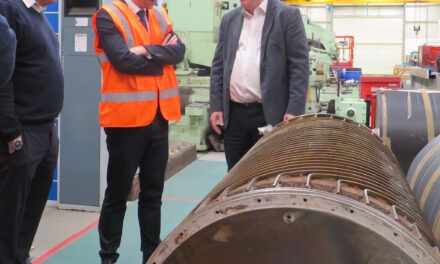Worn on the wrist, bra strap or waistband, Ally uses EDA – electrodermal activity – sensors to monitor the wellbeing of those overcoming sexual assault. By linking to a specially developed mobile app, the device allows counsellors and loved ones to monitor the wearer’s progress and identify when they might require assistance.
The gender-neutral device, which is due to be unveiled at the Made in Brunel exhibition in June, aims to give wearers a sense of safety and confidence.
“The long term recovery for sexual assault victims is not a pleasant one,” said final-year BSc Product Design student Josh King, 22, who was inspired to create the device after one of his friends was spiked whilst on a night out in his hometown of Woking.
“If the EDA sensors are showing that someone’s particularly stressed or showing signs of anxiety, the counsellor can give them a quick call or contact them directly through the app and say ‘the sensors are showing you’re not looking too good at the moment, let me know if you’d like to talk.’”
Ally also allows its wearer to manually trigger a distress signal using either a spoken safeword or a button press. A text message is then sent to both pre-programmed contacts and other nearby Ally users, whilst also recording a short audio clip for evidence gathering.
“The user always has control over who receives the distress signal, and who has access to their data,” said Josh.
 With similarities to Ask for Angela – a nationwide scheme which allows those on a night out to discreetly raise an alarm with bar staff by asking to speak to Angela – Ally can also be connected to EPOS (Electronic Point of Sale) devices so users can notify staff if they find themselves in a bad situation.
With similarities to Ask for Angela – a nationwide scheme which allows those on a night out to discreetly raise an alarm with bar staff by asking to speak to Angela – Ally can also be connected to EPOS (Electronic Point of Sale) devices so users can notify staff if they find themselves in a bad situation.
“It means the user doesn’t even need to go to the bar to ask for Angela – they can simply send a signal to the staff that they need help out of whatever awkward situation they find themselves in,” said Josh.
Currently in its working prototype stage, Josh is now soliciting feedback from counsellors working in the field to gauge the response to Ally.
Josh now hopes to start commercialising Ally, which has been developed so far with funding from the Ruislip St Martins Freemasons, and has identified two potential routes to market – sold individually through retail, and sold to clinics in larger packs.
“Potentially these devices will be sold in institutional packs of eight devices, which can then be loaned out to survivors free of charge,” said Josh, who has already had initial discussions with potential manufacturers.
“When the survivors get past the reconstitution stage, which could be months or years later, they’ll hand back the device to the clinic, who can then redistribute it.”

